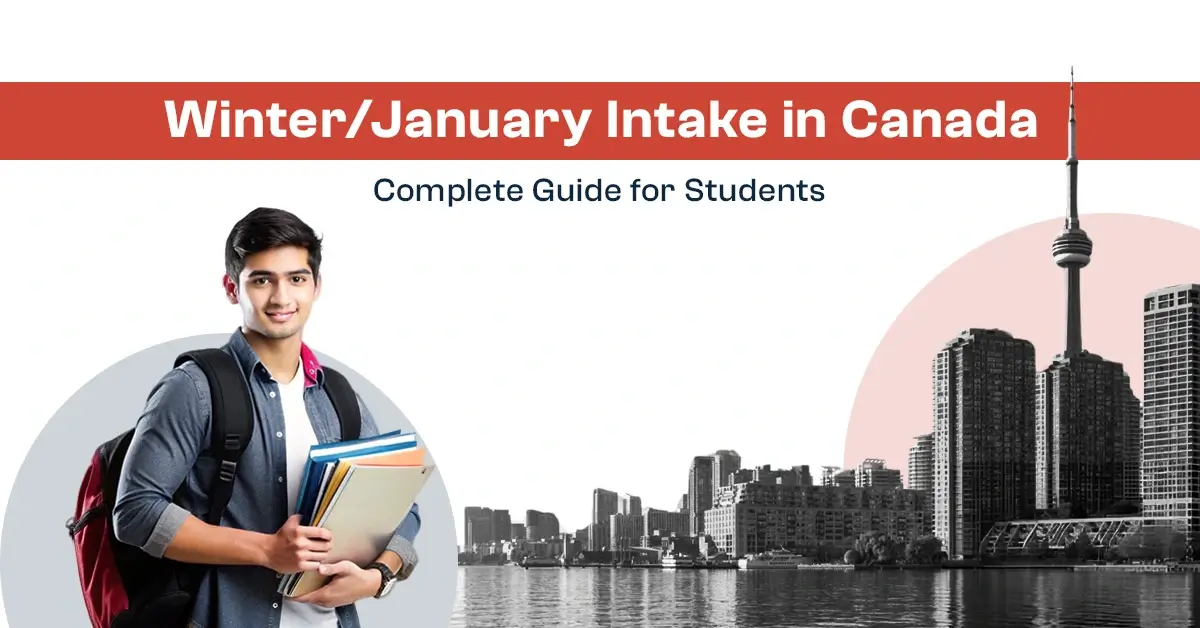Thinking about pursuing your education in Canada but don’t want to wait until next fall? January intake in Canada for 2026 is the best option! This lesser-known option offers a unique path for your academic journey in canada.
This blog will cover everything about the January intake Canada 2026 application process. We’ll explore universities, programs, deadlines, visa process, etc to help you choose the perfect program and university.
January Intake Canada 2026: An Overview
| Admission Deadlines | August 2025 to December 2025. Specific deadlines vary by institution. |
| Popular Courses | Computer Science, IT, Business Administration, and Health Sciences |
| Universities Offering the Winter Intake 2026 | University of Toronto, University of British Columbia, McGill University, University of Alberta, Dalhousie University, Simon Fraser University, Queen’s University, Cape Breton University, Douglas College, Carleton University. |
| Scholarships in the Winter Intake |
|
Advantages of January Intake in Canada
The January intake in Canada presents several exciting advantages, making it a compelling alternative to the fall intake. Here’s why winter intakes in Canada for international students should be considered:
- Potentially Less Competition: With many students aiming for the fall intake, January applications often see fewer applicants. This can translate to a higher chance of securing admission to your desired program, especially for competitive programs.
- Fast-Track Your Education: Starting in January allows you to graduate earlier and enter the workforce sooner.
- Ample Time for Preparation: The earlier application deadlines for canada january intake provide you with more time to meticulously research universities and programs, strengthen your application package (essays, letters of recommendation), and prepare for standardized tests (if required).
Colleges/Universities with Winter Intake in Canada
Below are some of the top January intake universities in Canada with their deadline
| College/ University | Application Deadline |
| Humber College | October 30 |
| Centennial College | October 25 |
| University of Saskatchewan | September 1 |
| Lambton College | August 31 |
| Durham College | October 1 |
| Fanshawe College | October 1 |
| University of Ottawa | October 15 |
| St. Clair College | September 15 |
| Carleton University | December 1 |
| McMaster University | October 5 |
| McGill University | August 1 |
| Vancouver Island University | September 16 |
| Queen’s University | November 20 |
| Cape Breton University | August 15 |
| University of Toronto | September 15 |
| University of British Columbia | January 15 |
| University of Manitoba | December 1 |
Is January/Winter Intake in Canada 2026 the Right Intake for you?
The January intake can be a good option for several reasons:
- If you missed the fall intake, the winter intake is right for you.
- The fall intake is more competitive, which means the winter intake will be easier for you to land in a college.
- Some courses are specific to the winter intake. So, if you feel the timing is right, you should get on your feet.
- If you are comfortable with the fast paced courses in the winter intake, then this is the right intake for you.
- Smaller class sizes means personal growth, attention given by teachers in class, and preferred environment suitable for international students.
- It is a lucrative option for time management as you have more time to efficiently arrange documents, funds, and exam scores.
Application Process (Timeline)
Convinced that January intake Canada 2026 is the right fit for you? Now comes the exciting part: applying to universities! Here’s a breakdown of the general application process to get you started:
| Research & Shortlist | Dive deep into university and resources to identify programs that align with your academic background and career aspirations. Create a shortlist of 4-6 universities that resonate with you. | April- May |
| Prepare Your Application Materials | Gather official transcripts from your previous educational institutions. Craft a compelling SOP Secure strong LOR Prepare for standardised tests like IELTS, TOEFL, GMAT, or GRE if required. | June -July |
| Submit Your Application | Carefully review application requirements and deadlines for winter intake in Canada (which can vary) and submit your complete application. | August – September |
| Track & Respond | Monitor your application status through the university portals. Respond promptly to any requests for additional information or interviews. | September -October |
| Decision Time and Beyond | Universities will notify you of their admissions decisions. Carefully review your options and deadlines for accepting or declining offers. If accepted, you’ll receive further instructions for securing your student visa. | November- December |
| Arriving in Canada! | Start your new academic journey. | January – February |
Pro Tip: Explore the official website of the university or connect with our study abroad counsellor for complete application process.
Scholarships for Winter Intake in Canada
- Karen Mckellin International Leader of Tomorrow Award at University of British Columbia
- Humber International Entrance Scholarships
- University of Manitoba Graduate Fellowships
- University of Waterloo International Master’s Award of Excellence
- University of Calgary International Entrance Scholarship
- Lester B. Pearson International Scholarship Program at the University of Toronto
- Vanier Canada Graduate Scholarships (Vanier CGS)
- International Undergraduate Student Bursary at the University of Manitoba
- UBC Graduate Global Leadership Fellowships for Developing Country Students
- Donald A. Wehrung International Student Award
Frequently Asked Questions
1. Is January intake less competitive than fall intake?
Yes, potentially. The fall intake is generally more popular, leading to a higher applicant pool for certain programs. Applying in January intake Canada might give you a slight edge in terms of competition.
2. What documents are required for the Winter Intake in Canada for 2026?
- Standardised examinations score – ACT, GRE, GMAT, and SAT.
- Proof of English language proficiency, i.e., TOEFL or IELTS scores.
- Transcripts of official academic records and certificates of extra-curricular activities.
- Photocopy of your valid passport.
- LORs or Letters of Recommendation.
- SOP (Statement of Purpose).
- Work Experience Certificates
- CV
- Professional references with contact
- Provincial attestation letter or territorial attestation letter
- Proof of identity or travel document
3. What is the Winter/January intake in Canada?
The Winter or January intake is the second major admission cycle in Canada, offering students an opportunity to start their studies mid-academic year. It has fewer courses and seats than the Fall intake but provides flexibility for those who miss September admissions.
4. How does the January intake differ from the September intake?
The January intake has fewer program options, limited scholarships, and slightly lower competition than the September intake. However, it allows students to start their studies earlier without waiting an entire year and provides a similar quality of education and opportunities.
5. What are the eligibility requirements for the January intake?
Eligibility varies by program but generally includes academic qualifications, English proficiency (IELTS/TOEFL), and relevant work experience (if required). Students must meet university-specific GPA requirements and submit necessary documents like SOPs, LORs, and resumes before deadlines.
6. What are the top courses available for the January intake?
Popular courses include Business Management, Computer Science, Engineering, Health Sciences, Hospitality, and Finance. However, availability varies across universities, so students should check specific institutions offering programs in the Winter intake.
7. What are the scholarship opportunities for the January intake in Canada?
Scholarship options are limited compared to the Fall intake but still available. Many universities offer merit-based, need-based, or external scholarships for international students. Some popular ones include the Ontario Graduate Scholarship and the Vanier Canada Graduate Scholarship.
8. What is the cost of studying in Canada for the January intake?
Tuition fees range from CAD 15,000 to CAD 40,000 per year, depending on the university and program. Living expenses, including accommodation, food, and transportation, add around CAD 10,000 to CAD 15,000 annually, varying by city and lifestyle.
9. Are there enough accommodation options for students arriving in January?
Yes, but options may be more limited than in September. Universities provide on-campus housing, while off-campus rentals and homestays are also available. Students should apply early to secure affordable accommodation near their campus.




